“I felt forever changed in that moment” Raquel Willis on life, liberation, and ego death

The writer and public intellectual speaks to Jazmine Hughes about her radical memoir The Risk It Takes to Bloom: On Life and Liberation.
Words by Jazmine Hughes
Photography by Justin J. Wee
Styled by Isaiah Dorty
Stylist Assistance Trevon Smith
Makeup by Laurel Charleston
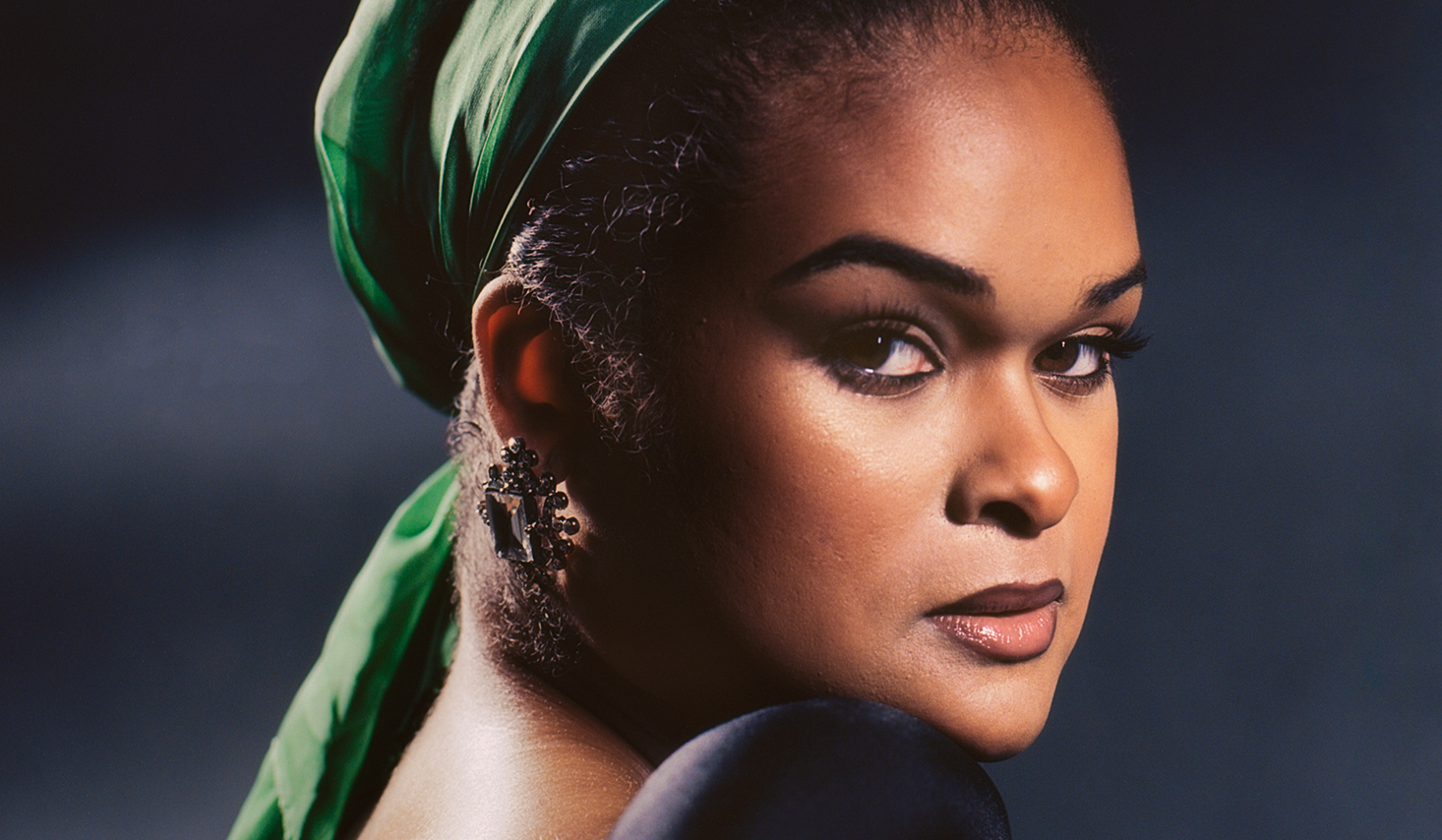
How useful it is, in the age of our phones – as our lives, our world, our education, our reality – that our intellectuals can traverse the screen with a bit of the ineffable, potent enough to slow us down. Raquel Willis does not compete for attention. She does her work, and if you start to pay attention along the way, all the better. (Not to mention: what took you so long?)
In a world where anyone can garner a following, and anything can become public, the role of “public figure” is no longer synonymous with having something to say. Willis, though, is different, having caught attention for her words for decades. First, as a journalist, where she won a GLAAD Media award for her “Trans Obituaries Project,” and, increasingly, as a public speaker and activist. Attention, obviously, does not always equal respect: In 2017, she was midway through her speech at the Washington, D.C.’s Women’s March – “As we commit to build this movement of resistance and liberation, no one can be an afterthought anymore. We must hold each other in love and accountability…” – when her mic was suddenly cut off.
The summer of 2020 was a flashpoint in collective social justice movements, bringing widespread, institutional focus – albeit temporarily – to racism, anti-Blackness, homophobia and transphobia. Willis was a speaker (and core organiser) for the summer’s Brooklyn Liberation march while privately coming to terms with being laid off from her dream job as the executive editor of Out magazine.
Before that day, Willis rarely felt seen or respected as a leader. After? “People who didn’t really understand who I was and what I was committed to flipped,” she said one bleary morning over tea and eggs. As many as twenty thousand people attended the Brooklyn Liberation March, and Willis addressed – and connected with – every one of them.
“I felt forever changed in that moment – there was an ego death,” she said. “I’d never felt more connected, not just to our community but to humanity in that moment.
Last fall, Willis released her memoir The Risk It Takes to Bloom: On Life and Liberation. The book kept me company on vacation. It was as if Willis was drinking a mezcalita beside me: the book is wry, and funny, and furious, with sweetness scattered throughout like chocolate chips in a cookie. The best parts are the most regular: there aren’t many memoirs where Black trans women go to college, or have awkward dating experiences, or move to a new city with a suitcase full of dreams.
“I’m not giving you the narrative of ‘I got it all figured out, oh, I’m fully bloomed on the other side,’ or that I found this forever love,” she said. “That’s not my experience.” Willis’ journey, then, feels only a few steps ahead of one’s own: the next turn on a map, an outstretched hand bringing you with her.
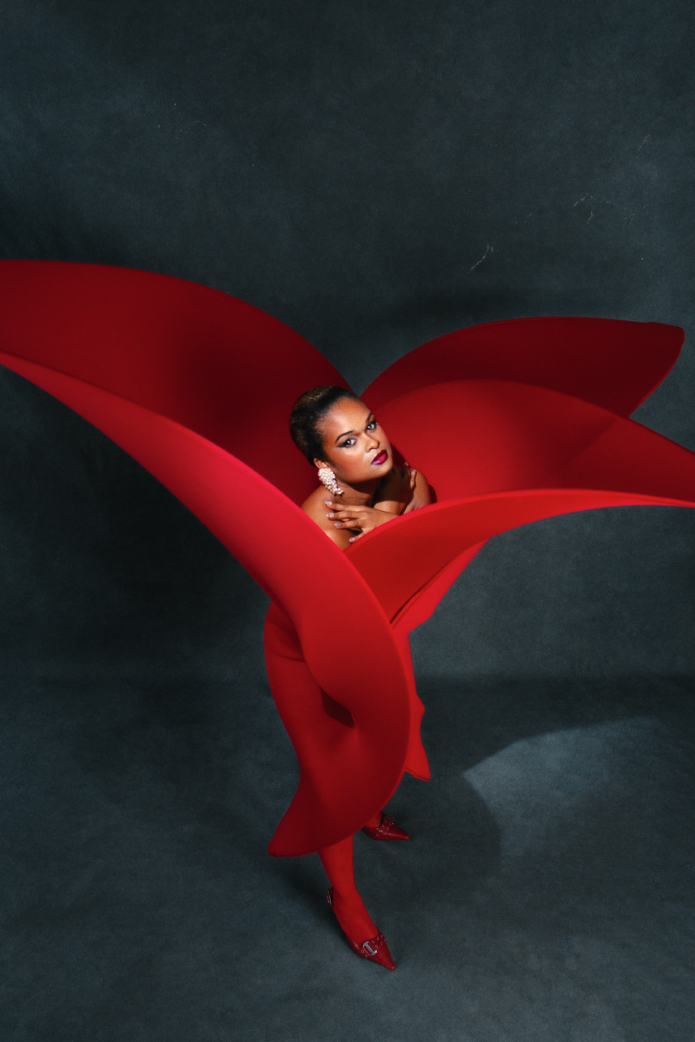
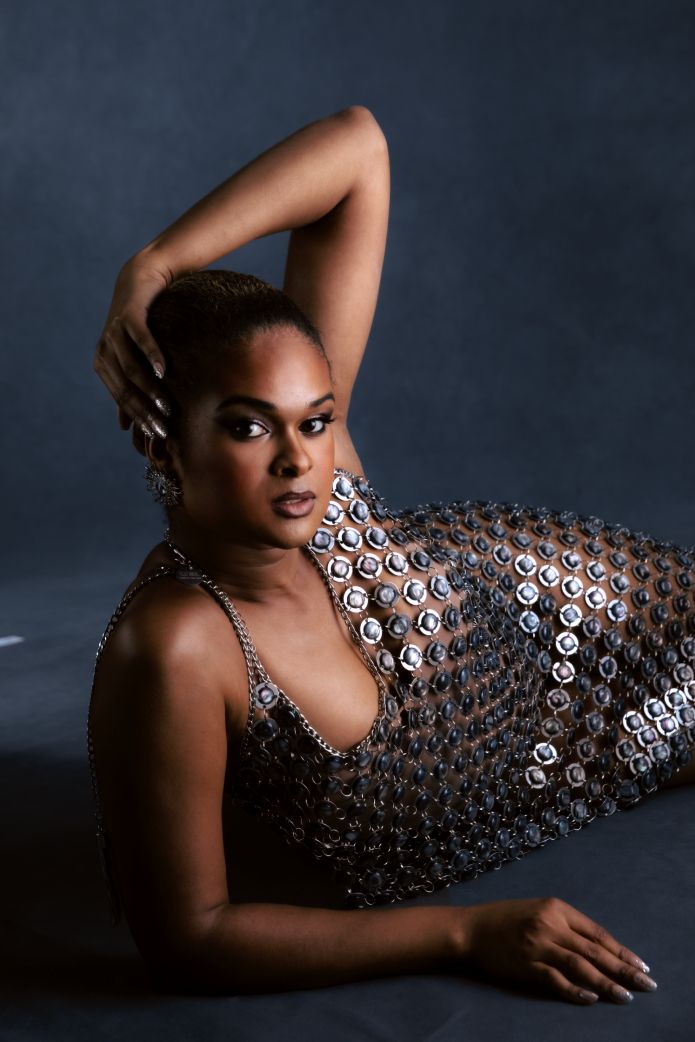
Left: dress BAD BINCH TONG TONG | shoes STEVE MADDEN earrings | DEBORA MALOUF JEWELRY | Right: dress KELSEY RANDALL | earrings DEBORA MALOUF JEWELRY
You decided to write this memoir about a decade ago, around the same time that Janet Mock released Redefining Realness. Did you consider yourself to be joining, perhaps, an emerging movement of trans narratives?
It wasn’t a fully fleshed out era – we weren’t calling it the “trans visibility era” yet. I felt so isolated being in Georgia, and it felt necessary for me to get to a point where I could write my story.
Then you started writing the book in earnest over the pandemic, starting in 2020, which felt like a time of such progressive promise.
And, of course, the murders of George Floyd, Breonna Taylor, Ahmaud Arbery, Tony McDade and so many others, I realised, “Oh, we’re in a moment now where folks are hungry to figure out their commitment for social justice.” So in writing this book, not only did I want to articulate my journey into my queerness and transness and how that connects to my Blackness and my womanhood, but also around how I developed a commitment to social justice and held onto it through all these various parts of my career. And I think that’s even more relevant now, as we have all these moments where we’re questioning our values.
Beyond the writing process, I’m curious about the remembering process. Growing up, were you taking notes on everything that was going on around you? Were you a big journal-er?
I’m a person who’s like, when a big important moment that I want to remember all the details of is happening, then I’ll journal. For instance, when I came out to my father, that was really a moment where I realised that journaling can be an escape, because I can’t tell them all the things I want to, and mean to, say, so let me just say it in this form.
Was the journaling more of an account of what happened, or a way to process your feelings?
Both. I wrote the details of what happened, the details of, for example, exactly what my parents had said to me when I came out to my father. But I also wrote, essentially, a letter to my parents.
Which is an approach that appears in the book: you write many letters, to your father, to Layleen Polanco. What effect were you going for?
It gave me a chance to look directly at the reader like, “Hey, this is the version of me that’s processed a lot of this,” but I also want to take you through this moment with me, and to be able to hold the awkwardness and difficulties, and the complexities and nuances, of what’s happening. It was a way to give life back to the folks that had died and had so thoroughly transformed my life. After having written all these letters, I really understand how much death has been such a catalyst in my life to grow into something else. I think that’s true for a lot of folks on the margins, whether we realise it or not. We have an opportunity to do something different – to use this as fertiliser – and that’s a testament to our movements. A lot of organisers are called to this work as a response to death whether we’re looking at the police murders of Black folks, the murders of Black trans women, or even the genocide of Palestinians. We have a lot of opportunity to be transformed, and that’s a lot of the struggle right now, in this moment. People are resisting being transformed in their humanity.
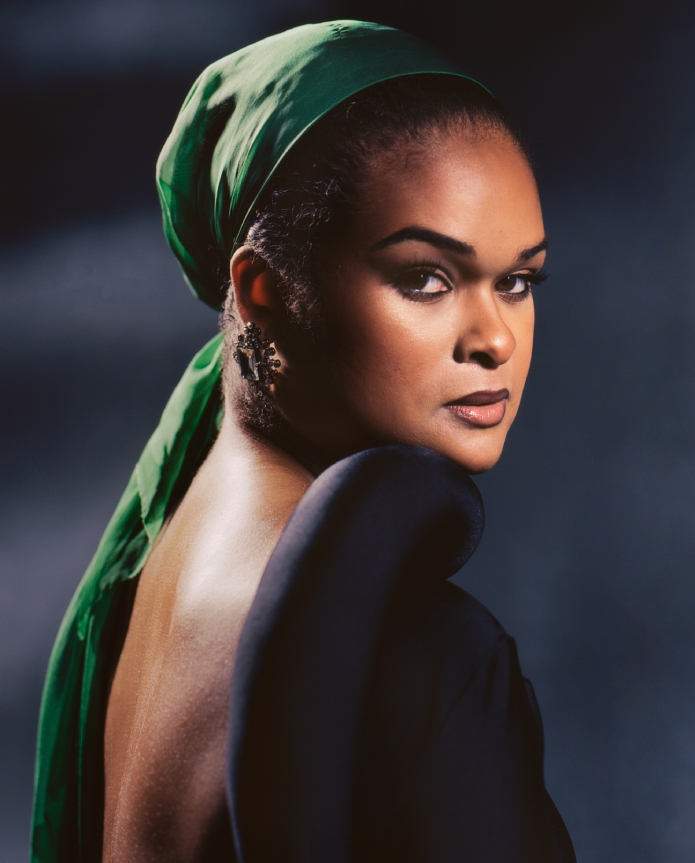
dress QUINE LI | earrings DEBORA MALOUF JEWELRY
Was there anything that you were nervous about putting down on paper?
I was nervous about talking about my family and the complexity of our relationships, and to be publishing moments on the difficulties with my loving parents and family. But what helped me was having conversations with family ahead of time. It forced an acknowledgement of the tension that existed. In the process, I’ve never been closer to my family. They were here for the launch event, and to have Laverne Cox and Elliot Page asking about some of these moments of trauma that I discuss with my family, with my family listening – it was a level of raw I could not have anticipated. The way that my family held those difficult moments with grace gave me a whole new appreciation for them and their evolution.
We both, as formally trained journalists, are taught that, historically and institutionally, journalism and activism have to remain far apart. Do you look at your memoir as a form of activism?
I write with a purpose. I want my work to be a bridge between the transcestors and transcendents to come. I don’t know we have to call that activism – I was going to say every writer writes with a purpose, but I don’t know if that’s true.
I think a lot of writers on the margins write with a purpose, even if the purpose is “live your truth.” The way that we’ve seen this get spun into “activism” or proof of bias – both generally, but also in the course of our own careers, is so crazy-making.
And I do have a bias, and it took me a long time to own that. I have a fucking agenda. But I’m not the only one. If you aren’t clear about having this sort of purpose or bias in your work, as a storyteller, then you’re feeding into the existing bias of white supremacy or cisheteropatriarchy.
It’s ludicrous that pretending to not have a bias legitimises you, but claiming your bias with your chest disqualifies you. And we both, as formally trained journalists, know how much that farce of neutrality is beaten into us as a central journalistic “skill.” How did you square the two?
I realised that not every environment was going to afford me to speak to everything. In my first job as a newspaper reporter in Monroe, Georgia, I was in a newsroom where I had to be strategic about how much I pushed the envelope because I was getting all these signals that I couldn’t be too progressive. I couldn’t be liberal. I had to give off this air of being moderate, which I was never able to really fucking do. I was lucky that I had a weekly column so I could voice my opinions on anything, so it became a bit of a sport to figure out what happens when I tried to push our conservative community. It was weird, figuring out how to profess my values without outing myself as a Black trans woman. And to say that now feels wild, but in that context…
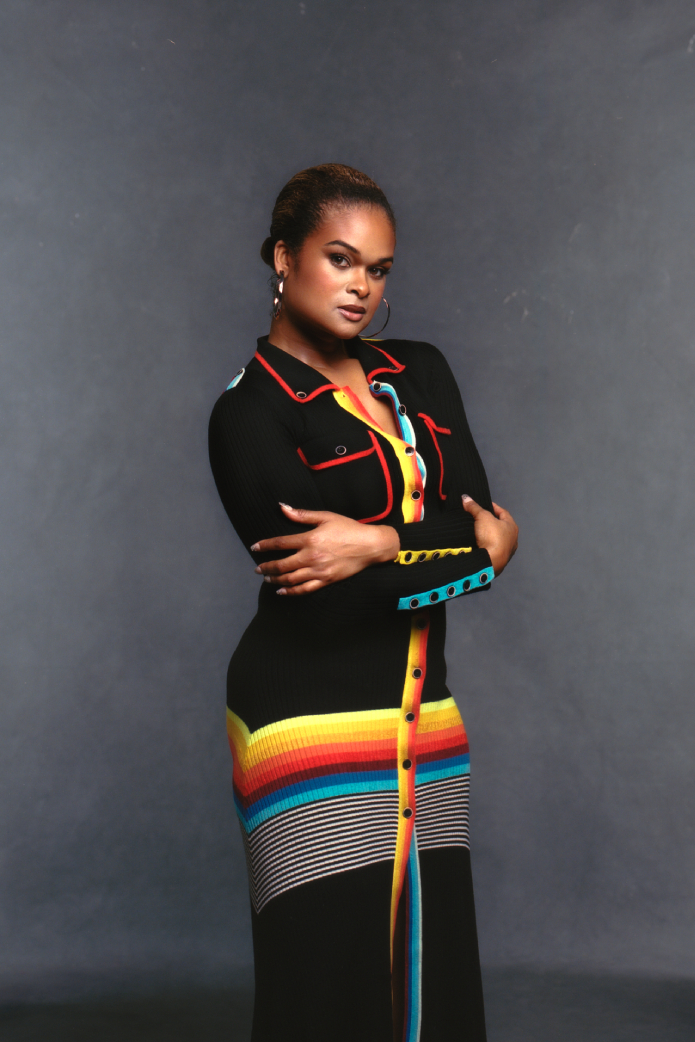
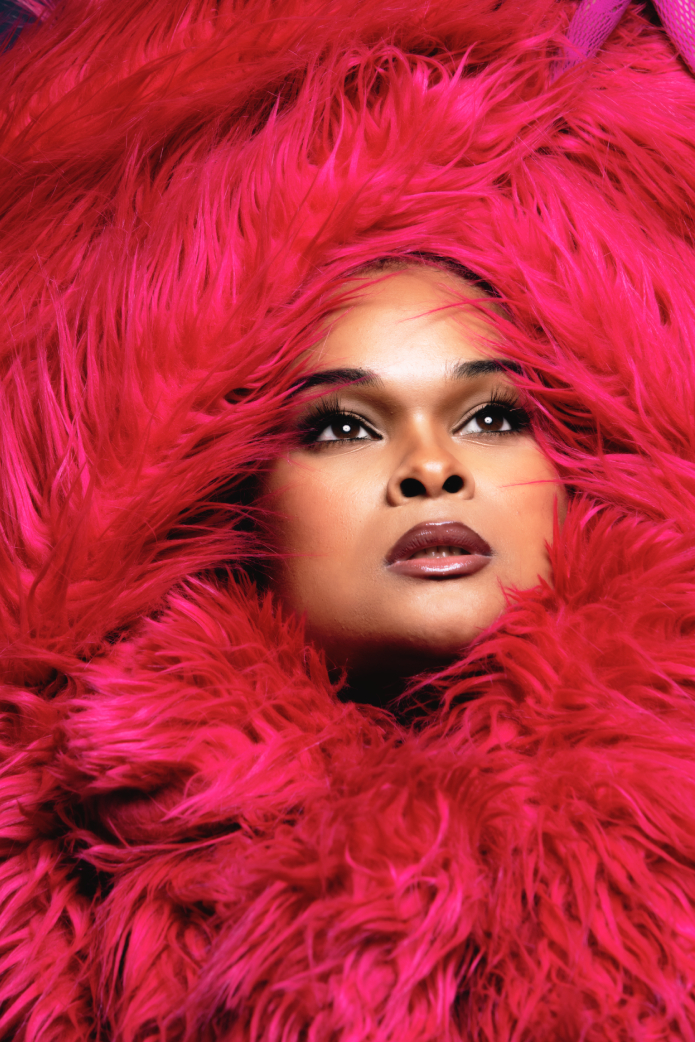
Left: dress CHRISTOPHER JOHN ROGERS | earrings ALEXIS BITTAR | Right: coat TWIGGY MOORE
You had to make a calculation.
It was a calculation, and it speaks to how ridiculous the argument is, that queer and trans people are always legible in our society. That’s not true. People don’t have the same fever around transphobia in their everyday life. You are not coming to me and telling me I’m “not a woman” because you’re gonna look fucking ridiculous. And yes, I’ll admit that some of that is tied up in respectability, some of that is tied up in privilege, but a lot of these folks are hard pressed to be as dismissive of folks on the margins in person as they are in the papers and on screen. Dave Chappelle and J.K. Rowling are not giving me the same fever in a one-to-one conversation out of the public gaze. So what does that mean about what they’re trying to telegraph about themselves? I feel like a lot of that is validation. At some point, you felt like whoever you are was called into question, and so the way that you reassert your existence, or power, or privilege is by stomping on folks who you already know are the victims of confirmation bias in our society.
What do you want readers to feel when they’ve finished the last page of your book?
As I was writing the epilogue, I was thinking about what gives me hope. We have to figure out how to hold the hard things and give ourselves joy, and what gives me hope is remembering that it’s all cyclical. Our ancestors – Black ancestors, queer and trans ancestors, whoever your ancestors are – endured difficulties, but they also had joy and pleasure. I don’t believe that they didn’t figure out how to have joy and pleasure. We’re called to do that.
Exactly. We – our joy, our strength – didn’t come out of nowhere.
I also think about wanting things to look better for the next folks, which is an exercise in empathy. It’s like, “How do you enjoy this life right here, and feel this power right here, and know that the world can be so much better, and to understand your duty to demand that better world for the next world who come along, so they can at least have their own baggage, and trauma, and not have to be working through your shit, too?” I don’t think liberation is this far-off distant thing, and the ways that we built joy and pleasure into our lives right now are the slivers of liberation that we have to cling onto. What are you willing to do to seize that? What are you willing to do to remember that you deserve that now?
The Risk It Takes to Bloom: On Life and Liberation is out now.
This interview is taken from the March 2024 issue of GAY TIMES. Head to Apple News + for more exclusive features and interviews from the issue.
The post “I felt forever changed in that moment” Raquel Willis on life, liberation, and ego death appeared first on GAY TIMES.
Go to Source
Author: Jazmine Hughes
